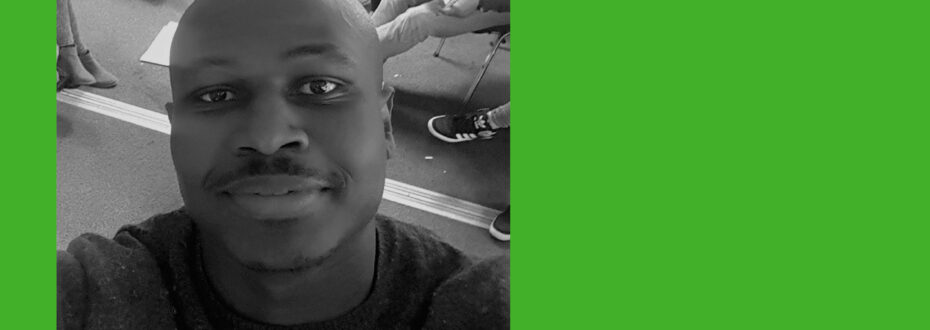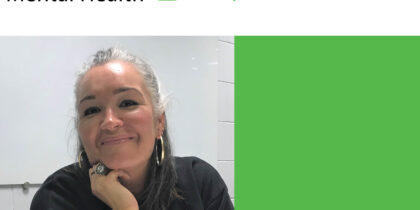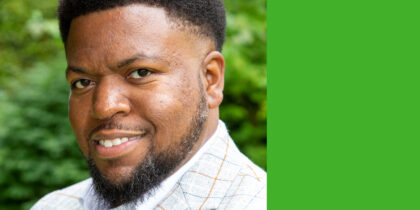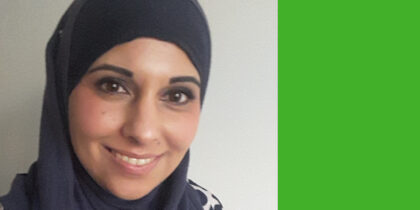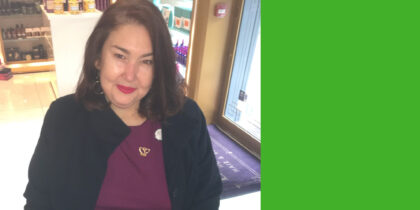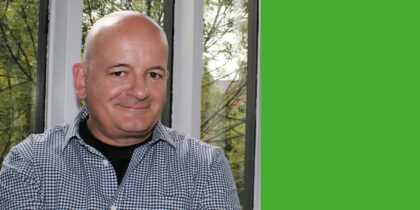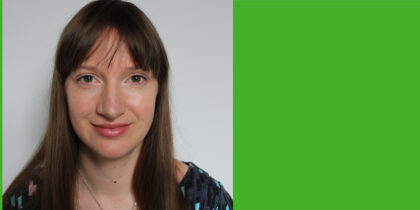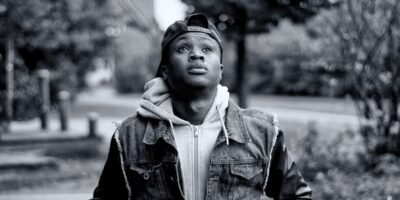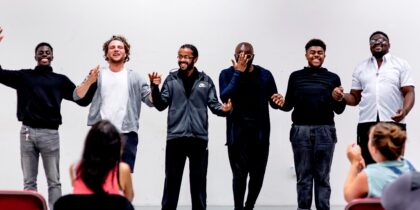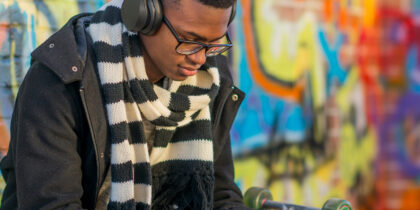This episode, we hear from Alex Augustine, one of the Centre’s peer researchers, on what genuine peer involvement and coproduction should look like. He shares his own journey to working for the Centre, how his own experience shapes the way he works, and the corrosive impact racism is having on the mental health of Black men. Alex also highlights the urgent need for organisations to put lived experience centre-stage, and for commissioners to fund community and grassroots organisations who can best meet the needs of people in the Black community.
Listen to the episode on Spotify or iTunes. The full transcript is available below.
Show notes:
- Read the report Alex was involved in, an evaluation of the ‘Up My Street’ working with young Black men in Birmingham
- Check out our briefing from Shifting the Dial, Young Black men’s mental health during Covid-19
Music by scottholmesmusic.com
Transcript
Alethea Joshi (AJ): Hello and welcome to Centre for Mental Health’s podcast, where we explore ideas around mental health, equality, and social justice. I’m your host, Thea Joshi, and in each episode we talk to people with lived experience, those working in a specific area of mental health, or some of our own team, to share how we’re working in the fight for equality in mental health. I recently caught up with Alex Augustine, one of our Peer Researchers, to hear about how his own experience shapes the way he works. This was such a brilliant, honest, challenging conversation, with Alex highlighting the corrosive impact that racism is having on Black people’s mental health. He also makes a really key point for both the voluntary sector and those who fund it, around commissioning the grassroots organisations who are best placed to meet a communities’ needs, over larger organisations who might submit impressive bids but don’t actually have the expertise. Hope you enjoy.
AJ: So I’m here today with Alex Augustine. So you were telling me that you’ve been working at the centre in one way or another since around 2013. But you are officially our lead peer researcher, or our peer research associate, many other titles. So it’d be great to know a little bit more about the work that you’ve been doing recently as part of the Centre?
Alex Augustine (AA): So recently, I’ve been working across a few projects for the Centre. Yeah, as you mentioned, I’ve been working with the Centre since 2013, on a freelance basis, but in February 2021, they offered me a part time contract, which I happily accepted. Since then, I’ve been working on a project with St. Giles and a newly formed team called the Gateway Project. Gateway are an organisation made up of mostly clinical psychologists, and St. Giles offering youth workers. And together they form a team who aim to meet the needs of young people. So they can meet emotional needs, you know, mental health needs, and sort of social and practical needs as well for young people. So I’ve been interviewing everyone involved in that project to find out whether that project is working the way that it was hoped to work. So that’s one project.
I’ve also been working on the London Violence Reduction Unit project, which we’ve been speaking to people in seven different areas across London, to find out why their area have such a high such high rates of youth violence and deprivation and whether there’s a link between the two. And I’ve also been doing a little bit of work on Shifting the Dial, which is part two of an earlier project that I worked on when I first joined the Centre, which is looking at, well it’s called Shifting the Dial because it’s about Shifting the Dial on young Black men’s mental health, you know, how to build mental resilience and that sort of thing. So yeah, I’ve been I’ve been busy. And representing the Centre well, I hope.
AJ: Amazing. And 100% you have. So obviously, we did a piece of work earlier this year, specifically on young men’s mental health during Covid. That was part of the Shifting the Dial work. And it’d be great to hear a little bit more about that project. Like I know, it’s based in Birmingham, working alongside grassroots organisations there. Could you tell us a little bit more about the project?
AA: So initially, I went to the first couple of meetings, and it was supposed to be about how to build mental resilience in young Black men in Birmingham. I guess, like I said, it was given a name Shifting the Dial, because it’s about shifting the dial on that topic. So I guess progressing that conversation. After the first initial meetings, though, I was sort of not removed, but I wasn’t involved in that project for a long time, there was a massive chunk in the middle, where I worked on other things, and, you know, life was happening. And then only recently, I’ve come back into the project to conduct some interviews with some of the project leads, I’ve run a couple of focus groups of some of the participants as well/ In terms of the young men who attend various, because it’s two separate projects coming together to form Shifting the Dial, it’s Lightpost who are small theatre group, and First Class Legacy who are a bigger organisation who usually have quite a few young people come into their events, they’ll put on events to try to have role models or other Black entrepreneurs or, you know, people that can be looked up to in the Black community. They’ll have these guys speaking to the young people and encouraging them and sort of giving up blueprints as to how to kind of pay their way to success, if you will. And then the Lightpost, a theatre group, they try to use their acting skills, theatrical sort of scenes and things that they create, to tackle certain issues, whether it’s to do with gender, identity, race, religion, anything like that, mental health. So the two separate projects have been well, in terms of keeping to themselves and keeping true to what they do, giving young people a place to go, you know, helping them to build resilience supporting each other.
AJ: That work sounds incredible. It’s obviously so needed. And I wondered if you could tell me a little bit more about, what is the Centre’s role in that? Obviously, we’re working, as you say, with Lightpost and with First Class Legacy, who are delivering some of these pieces of work. What’s the Centre’s role? And what’s your role within that?
AA: Me personally, my role, I represent, in a sense. I think that we should be, again, looking to find out whether this partnership is working well, and doing what it says on the tin. Everything that we hoped would come from the project, are these hopes realised? Or if not, what needs to be improved?
AJ: Amazing. I don’t know if it’s too early to ask this. But have there been any early findings from the interviews and the focus groups that you’ve been holding?
AA: Yeah. So the projects themselves, the two separate projects, First Class Legacy, and Lightpost, they do really well with what they do, because they were doing it before we came along. And they’ll be doing it long after we’re no longer working with them, hopefully. They do what they do very well. With the next round of interviews that are going to be taking place, it’s just reminding the project leads that you know, you are doing what you do, and you’re doing very well. You’re building mental health in young Black men, and we would like to capture that in an honest way.
AJ: Yeah, that’s amazing. So I wondered if you could just tell me a little bit more as well about how you personally got into peer research, and a little bit more about your story?
AA: So how did I get into peer research? I was a youth worker at another youth charity. And I was going into different settings where young people were, young people who are either in gangs are at risk of joining gangs, or deemed as ‘naughty’. I was spending time with these young people. And, you know, being a role model, to them, speaking to them, working with them, usually using music, or creative writing as a tool to engage with them and build rapport with them. I was, I guess, you know, headhunted or recruited by Lorraine Khan, who at the time was an associate director, I think, yeah, to be trained as a peer researcher so that I can do what I was doing at the time, but, you know, more nationally, so wherever the Centre needed to work with young Black men, I might be able to help. It just so happened, that a project came up in Birmingham, which was Up My Street. And I was involved from the very beginning of that project. So yeah, that’s how I that’s how I got involved with the Centre, 2013 to date.
AJ: Yeah, that’s really helpful background. I’m really interested to understand a bit more about how your own lived experience affects the work that you do. And the way you carry out your role as a peer researcher, how has that shaped your work?
AA: So growing up myself, you know, I was a naughty kid. I was, the young Black men who we are engaging today, I was them as a child, myself. And I know, as an adult, now, as a professional, I can look back and see what was missing, I can see that there were a load of ‘me’s who exists today that just weren’t around back then. And so, all my needs back then were unmet. And I just would take things into my own hands and ended up getting into a life of crime, you know, being in a gang from very early and that’s just what it was. That was just the standard. That’s just what you did back then. And I guess everything, all my experiences back then growing up, those are the things that help me to be able to relate to the young people now that we work with, and to be able to connect with them, relate with them, work with them, coproduce with them. I have unique perspectives on both sides, which not many people get to have. And I think that’s one of the reasons why I believe I do what I do well, today.
AJ: Yeah, 100%. And I think, obviously, you, me, we’re very clear, and the Centre as a whole, that lived experience has to be at the heart of what we do, and has to be at the heart of research, because if we’re not hearing from the people who’ve actually experienced the things that we are studying, then we are removed, then we become kind of in our ivory towers, or whatever. And so peer research is obviously a massive part of that.
AA: Just to touch on that, so that’s actually true, yeah, and the frustrating thing is, when we collaborate with an organisation who have members who don’t have the lived experience, yet they want to be the ones to sort of lead on a project where the lived experience is what’s most needed. You know, you want to connect with young Black men who have mental health issues, unmet needs, whatever the case may be, are in gangs. You have peer researchers, not just myself, but others who have lived experience of those things, and can probably best relate to those young Black men and be able to feed back what their needs are. But people like myself and others are sort of put to one side and not really listened to enough, you know, not listened to enough. And therefore, it leads to projects just regurgitating, doing what’s been done before, for years, decades, and producing no fruit, or something that looks like a result, but actually, it’s not going to create a long-lasting change.
It’s just, it almost feels like most organisations, if not all, want to be in this phase, where they can just say, ‘Yeah, we’re trying to do this, we’re trying to bring change, we’re trying to meet the needs, we’re trying to…’, and just want to be there forever, instead of actually doing some positive risk-taking, listening to the people who you need to be listening to, and actually using the guidance of lived experience, lived experience itself, and, you know, also the sort of academic side of those with the degrees in psychology and whatnot. Combining the two to work together to actually make effective change happen, actually do something, rather than just, you know, putting the lived experience to one side, and just repeating what’s been done before, over and over, and making it look like things are happening. When, actually, if I can use a quote, ‘that man’ isn’t able to fish for himself. He’s still relying on the fish that you gave him, if that makes sense.
AJ: Yeah, I 100% agree with you. And that’s such a crucial point to make. And yeah, I think there’s that thing isn’t there about, if you keep doing the same thing, you’ll keep getting the same results. And I think for so long, lived experience in various forms has, as you say, been put to the side, or has been kind of ‘wheeled out’ when it felt like it was necessary or helpful, or you know, ‘interesting’. And then again, shoved to the side for the in quotes “real” research to happen. And instead, what we’re saying is no, lived experience needs to be at the core, you need to listen to the people who’re experiencing stuff, if you want to great services are actually going to help them learn in a sustainable way, as they say. And yeah, like you said, empowering people to make their own way rather than kind of the idea of like doing to people instead of like working with them. And yeah, that’s critical, isn’t it?
AA: Yes, absolutely.
AJ: And you were talking quite a bit there about sort of the unmet needs of specifically young Black people within that work of Shifting the Dial. what are the needs that you have been seeing coming out of Shifting the Dial, out of the work with St. Giles, or working with young people, young people from racialised communities, or specifically young Black people? Like what are the needs that you’re seeing coming out?
AA: So people usually don’t have inheritance or a future, same thing, usually, pretty much. There’s just something about not seeing a bright future, not knowing that security is there, that keeps you constantly worried, constantly chasing money, this illegal activity, that illegal activity, this job, that job, can’t hold down a job. There’s just a lot of uncertainty, if I was to sum it up in one word. All of those things come down to just lack of security, lack of a future and uncertainty. And that’s the overarching sort of issue that’s coming up. It leads to negative mental health issues, you know, panic attacks, and heartburn, and high blood pressure, and, suicidal tendencies and all these issues.
And when you add to that society, societal and the media’s perception and projected perceptions of Black people. And the drip feed, the negative drip feed effects that those have, all of that is just not conducive to positive wellbeing and a positive future. Across the different projects that I’ve worked on, in different ways, the same things are being said. Sometimes it’s bang on, you know, across two different projects. But sometimes it’s like, the sentences are tweaked slightly but people are saying the same thing. And it was there before we all got here; it will be the same after we’ve all left and there are different researchers and different participants, it will be the same. So yeah, I think, again, I come back to the point of, we need funders to be funding the right people. Not necessarily the organisations that have the best history and the best bid writers and who can use the best language and know what to say and how to say it. Because those guys weren’t necessarily do the effective work. And not necessarily, I’m not saying definitely they won’t, but they won’t necessarily be able to relate and do the effective work where it’s needed in the Black community. Whereas an organisation that’s run by Black people will, you know, most probably will. But they don’t have the excellent bid writers, and, you know, the history and the financial history and all of that stuff. So that’s the problem.
You know, if there’s a loan that’s needed, to fund this Black organisation that wants to genuinely do good work in order to build up this Black community here, if I walk into a bank, dressed as myself, not knowing the correct language to use, but my heart’s in the right place, I’m genuinely going to do the work, I’m probably going to get turned down. Whereas if my white counterpart walks in, dressed as themselves and uses, you know, their language and everything like that, and they do know what to say and everything, they’re the ones that are going to get the funds, and that wouldn’t matter if they were going to go and actually know what to do with those funds, and spend those funds in the right areas. But that’s usually not the case. And then, unfortunately, the ones who can actually make a difference, the gatekeepers, the role models, they don’t get the opportunity. And so the cycle continues.
AJ: And that’s what we’re seeing, isn’t it? We’re literally seeing that play out within organisations, and it’s yet another example of white supremacy and white privilege that as you say, big organisations, perhaps with more infrastructure, who know how to play the game, are more likely to get funding then Black-led or grassroots organisations who are actually working in communities and actually know how to reach people. And we’re literally seeing the impacts of like, institutional racism play out at that level as well. And then, as you said before about the impact that is literally having on the young Black people that you have been working with in these various projects, like the way that we’re seeing all of that uncertainty, that was the word you used, right? That uncertainty, the impact that has on your sense of wellbeing, and your sense of hope for the future.
And it’s what we keep saying, isn’t it, that you can give the best mental health support in the world. But if people don’t have like, job security, income security, safe housing that’s not kind of gonna get pulled from under their feet, then it’s all a bit pointless. You’ve got to see the whole picture that someone is dealing with. And so it’s not okay, I mean, we need to provide better mental health services for young Black people, people from racialised communities, we know we need to do that, but even that on its own is not really going to square the circle, it’s not going to provide any kind of equality, if we’re not looking at the bigger picture. Yeah. So thank you for sharing that.
So I’m really grateful for what we’ve covered. And I guess I’d love to just ask you, finally, this is a big question. What do you think is needed? And I know, that’s a massive question. And we’ve just clarified how big it is, and how holistic a picture we need, but what is needed to address that sense of insecurity, uncertainty, that has this eroding effect on mental health?
AA: So I’ll use myself as an example. Before we started doing this, we were talking about taking a break. And you were saying to me, look after yourself, you know, don’t work like that, take a day, sort of thing. And I was explaining why I work the way I do. And that’s part of the answer to this question. I know that I represent, I’m gonna say Black men, I don’t know if I can say Black people, maybe but what I do know is that I represent Black men who didn’t fancy school, you know, who weren’t sort of able to connect with traditional schooling in the way that most others do, and have been able to. Who have different learning styles, and therefore weren’t able to get the degrees or stick it out and are now sort of considered ‘late bloomers’ trying to make a way, trying to use what they do know, to develop themselves and progress and build a life and/or future for themselves. When you’re in that boat, it means that you do look a bit like a workaholic.
Ironically, there’s a stereotype that Black men are lazy, and don’t want to work. But that’s definitely not true. I think because the traditional sense of schooling and education isn’t designed for us, it makes it look as though we don’t want to apply ourselves. We have different ways of learning and we have different ways of understanding, you know, which help us to sort of develop the same, but we have different ways of taking on the information and retaining it. The traditional sense just isn’t it for me, personally, and the ones that I’m speaking for.
So I am where I am now, which means I have to work hard, I have to have two or three jobs if I don’t want to do anything illegal, and there’ll be plenty out there that have to, and it’s not to show off, it’s not to go on holiday all the time. It’s just for survival. It’s to be able to pay bills and to be able to look after yourself, you know, Maslow’s hierarchy of needs, and to be able to just, if it allows it, have some savings, and in most cases that’s not even possible because things can arise and that means those savings are gone. Dental procedure, mould, I don’t know, anything So, because we don’t have that sort of bright future in education, chances are we don’t have the inheritance from a parent or grandparent who’s passed away or whatever, we have to make do for ourselves. So that’s why the word ‘hustle’ is very popular in Black culture, because that’s what you got to do, you got to hustle, I know the drug dealer has made that word famous. But, you know, in the sense that I mean it, you have to be constantly working in order to gain as much funds as you can. And even then, usually, it’s just enough for survival.
So to answer your question, I think, I need my employers to kind of bear with me if I make mistakes and get things wrong, or slack here and there. I know that I can’t, by the way, I know I can’t make mistakes. I don’t feel like I can. You know, which is another thing, which ties into the job security thing. It’s a bit like you’re almost one mistake or one argument away from being asked to leave, in one way or another. But like, yeah, so you need the people who, if you do have a job, you need people to bear with you, bring you on and support you, and try to understand. You need understanding. It is a big question. And that answer is just one answer. That’s just one part. And there’s multiple other parts, which we obviously don’t have time to go into now. But yeah, that’s one aspect.
AJ: Yeah, as you say, it was a very big question that I did just spring on you. But what you shared there is just an incredibly valuable insight that we need to take on and we need to apply when we’re talking about improving policy, and actually making change happen. But Alex, thank you so much for coming on the podcast. I think we’re going to have to have you back on again, because there’s so much more that we need to be talking about there.. So we’d love to have you on again in the future. But thank you. Thanks for what you shared. We are so grateful for your work. Yeah, thanks so much.
AJ: Hope you enjoyed the episode. You can find out more about our work by visiting our website. And to join us in the fight for equality in mental health, please donate at www.centreformentalhealth.org.uk/donate. See you next time.

